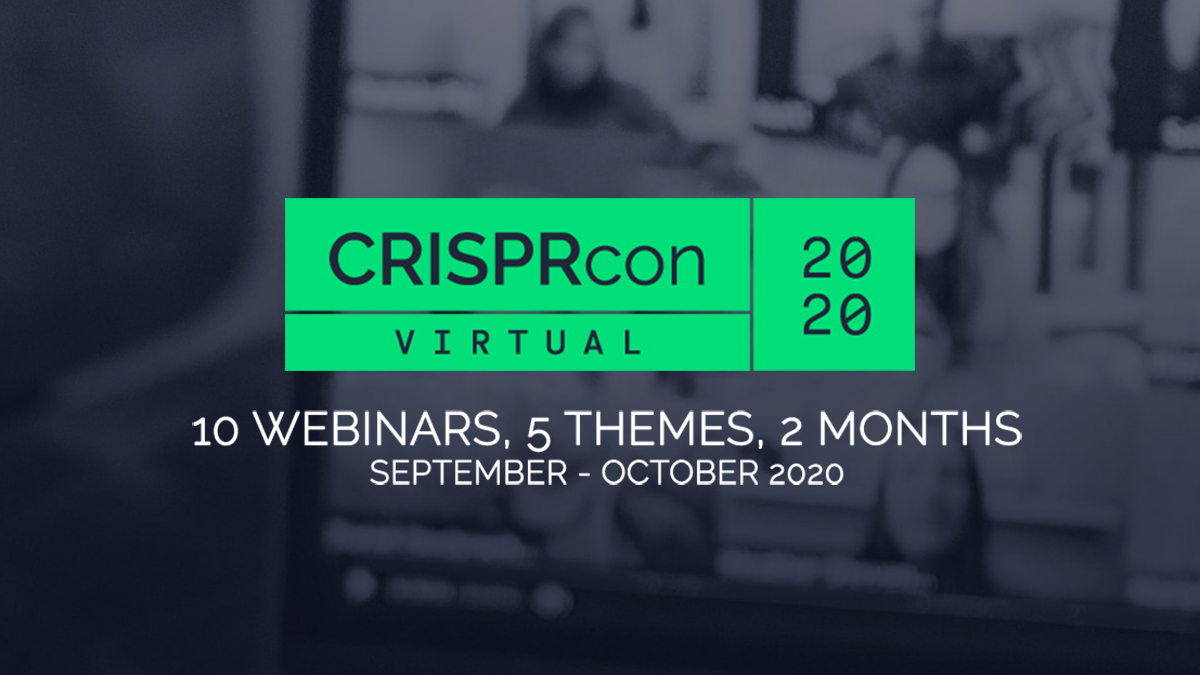
- This event has passed.
CRISPRcon 2020 – Equity, Environment, and Agriculture

CRISPRcon 2020 – Equity, Environment, & Agriculture
CRISPRcon is a unique forum bringing diverse voices together to discuss the future of CRISPR and related gene editing technologies across applications in agriculture, health, conservation, and more. CRISPRcon sparks curiosity, builds understanding, and highlights societal histories and other context relevant to decisions on gene editing technologies.
RegisterWorld events are keeping gene editing in the spotlight. In the development of tests and treatments for COVID-19, attention on racial disparities and inequities, strategies to address climate change, and evolving governance approaches in the U.S. and abroad, dialogue about the impact and use of gene editing technologies is as relevant as ever.
CRISPRcon: Conversations on Science, Society, and the Future of Gene Editing returns this fall with a series of webinars exploring gene editing’s role in these and other pressing issues.
CRISPRcon 2020 Virtual will continue to advance broad dialogue on societal considerations for gene editing technologies. In a year that has transformed the world in unexpected ways, plan to join us virtually for a dynamic, diverse, and timely lineup of interactive discussions that consider gene editing across applications, disciplines, geographies, communities, cultures, and perspectives.
Equity, Environment & Agriculture
(in partnership with NC State University Genetic Engineering and Society Center)
Genome editing has been criticized by some as a product of the scientific, political and social approaches to ecological and agricultural systems that contribute to rather than curb social inequities. It has been touted by others as a breakthrough tool for addressing equity issues in public health, agriculture, food and conservation, including those related to climate change. This week, CRISPRcon will explore how social equity factors into non-human gene editing, first exploring how risks are defined and governed in food systems and then exploring potential risks and benefits for climate justice.
October 13, 10:30 AM – 12:00 PM EDT – Risk governance in gene editing and food: Intersections of safety and equity
Societal concerns regarding gene-edited food and agriculture products are wide-ranging, encompassing issues such as human safety, ecological impact, animal welfare, socioeconomic implications for agricultural communities, distribution of societal impacts and benefits, and control, access, and sovereignty within food systems. The assessment and management of various potential risks is distributed among regulators, researchers and developers, and other societal actors; questions of who defines what risks are managed, who manages them, and to what standard represent equity and political concerns in the risk governance process. This panel will consider the scope and governance of different categories of risk in various geographies, including how risk is currently addressed and how it might alternatively be addressed through regulatory and other processes.
MODERATOR
October 15, 3:00 PM – 4:30 PM EDT – Gene editing and climate justice: Adaptation, mitigation, and conservation strategies in a changing world
Societal impacts of climate change will not be distributed equally among geographies and populations. Proponents of gene editing forecast conservation applications whereby gene editing might aid in climate change adaptation (and, sometimes, mitigation) for vulnerable communities and ecosystems. Yet these technological solutions may create their own inequities and risks, both ecological and social. This session will explore what is at stake — including both risks and benefits — in the use of gene editing to address climate justice/equity issues.
- Katie Barnhill-Dilling
Postdoctoral Research Scholar; Affiliate, North Carolina State University, Department of Forestry & Environmental Resources; Genetic Engineering and Society Center - Riley Taitingfong
PhD candidate, Department of Communication at UC San Diego - Shantha Ready Alonso
Executive Director, Creation Justice Ministries - Sara Fern Fitzsimmons
Director of Restoration, The American Chestnut Foundation at Penn State University
October 15, 4:45 – 5:15 PM EDT – Ideas Marketplace: breakout discussions on Equity, Environment, and Agriculture
Immediately following the panel discussion, we will hold an Ideas Marketplace, where volunteer hosts will lead other CRISPRcon participants in informal video breakout discussions on a topic of the host’s choice. (Interested in being a discussion host? Apply here by September 17)
WordPress database error: [Unknown column 'wp_tec_occurrences.start_date' in 'SELECT']SELECT SQL_CALC_FOUND_ROWS wp_posts.*, CAST( wp_tec_occurrences.start_date AS DATETIME ) AS event_date
FROM wp_posts LEFT JOIN wp_term_relationships ON (wp_posts.ID = wp_term_relationships.object_id) LEFT JOIN wp_postmeta ON ( wp_posts.ID = wp_postmeta.post_id AND wp_postmeta.meta_key = '_EventHideFromUpcoming' ) LEFT JOIN wp_postmeta AS mt1 ON ( wp_posts.ID = mt1.post_id )
WHERE 1=1 AND wp_posts.ID NOT IN (15002) AND (
wp_term_relationships.term_taxonomy_id IN (83,329,711,797,803)
OR
wp_term_relationships.term_taxonomy_id IN (47,589,655)
) AND (
wp_postmeta.post_id IS NULL
AND
( mt1.meta_key = '_EventStartDate' AND CAST(mt1.meta_value AS DATETIME) >= '2026-02-12 08:22:28' )
) AND wp_posts.post_type IN ('post', 'page', 'attachment', 'tribe_venue', 'tribe_events', 'tribe_event_series') AND ((wp_posts.post_status = 'publish'))
GROUP BY wp_tec_occurrences.occurrence_id
ORDER BY event_date ASC, wp_posts.post_date ASC
LIMIT 0, 3